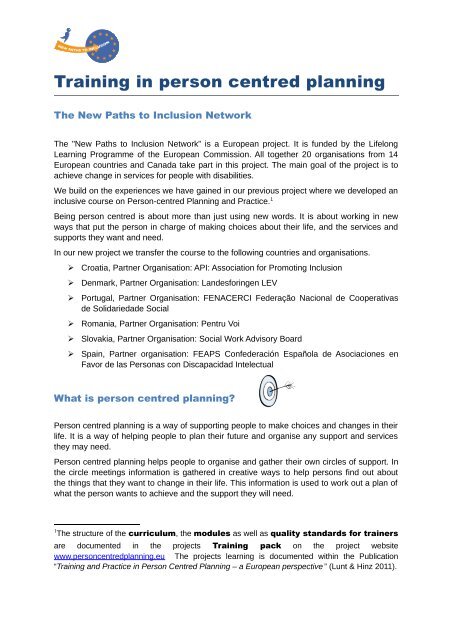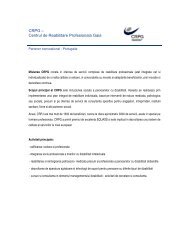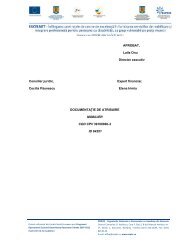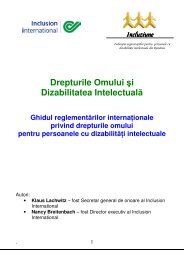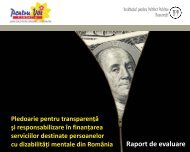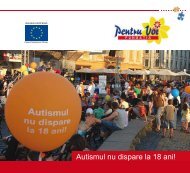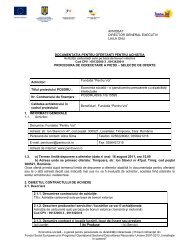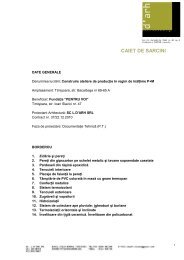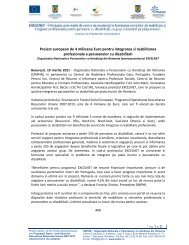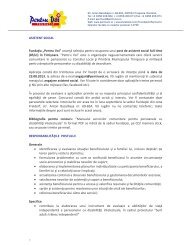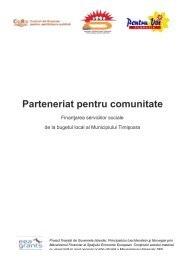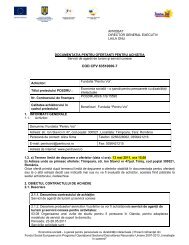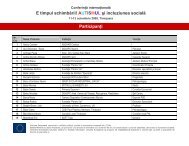Training in person centred planning - Fundatia Pentru Voi
Training in person centred planning - Fundatia Pentru Voi
Training in person centred planning - Fundatia Pentru Voi
Create successful ePaper yourself
Turn your PDF publications into a flip-book with our unique Google optimized e-Paper software.
<strong>Tra<strong>in</strong><strong>in</strong>g</strong> <strong>in</strong> <strong>person</strong> <strong>centred</strong> plann<strong>in</strong>g<br />
The New Paths to Inclusion Network<br />
The "New Paths to Inclusion Network” is a European project. It is funded by the Lifelong<br />
Learn<strong>in</strong>g Programme of the European Commission. All together 20 organisations from 14<br />
European countries and Canada take part <strong>in</strong> this project. The ma<strong>in</strong> goal of the project is to<br />
achieve change <strong>in</strong> services for people with disabilities.<br />
We build on the experiences we have ga<strong>in</strong>ed <strong>in</strong> our previous project where we developed an<br />
<strong>in</strong>clusive course on Person-<strong>centred</strong> Plann<strong>in</strong>g and Practice. 1<br />
Be<strong>in</strong>g <strong>person</strong> <strong>centred</strong> is about more than just us<strong>in</strong>g new words. It is about work<strong>in</strong>g <strong>in</strong> new<br />
ways that put the <strong>person</strong> <strong>in</strong> charge of mak<strong>in</strong>g choices about their life, and the services and<br />
supports they want and need.<br />
In our new project we transfer the course to the follow<strong>in</strong>g countries and organisations.<br />
<br />
<br />
<br />
<br />
<br />
<br />
Croatia, Partner Organisation: API: Association for Promot<strong>in</strong>g Inclusion<br />
Denmark, Partner Organisation: Landesfor<strong>in</strong>gen LEV<br />
Portugal, Partner Organisation: FENACERCI Federação Nacional de Cooperativas<br />
de Solidariedade Social<br />
Romania, Partner Organisation: <strong>Pentru</strong> <strong>Voi</strong><br />
Slovakia, Partner Organisation: Social Work Advisory Board<br />
Spa<strong>in</strong>, Partner organisation: FEAPS Confederación Española de Asociaciones en<br />
Favor de las Personas con Discapacidad Intelectual<br />
What is <strong>person</strong> <strong>centred</strong> plann<strong>in</strong>g?<br />
Person <strong>centred</strong> plann<strong>in</strong>g is a way of support<strong>in</strong>g people to make choices and changes <strong>in</strong> their<br />
life. It is a way of help<strong>in</strong>g people to plan their future and organise any support and services<br />
they may need.<br />
Person <strong>centred</strong> plann<strong>in</strong>g helps people to organise and gather their own circles of support. In<br />
the circle meet<strong>in</strong>gs <strong>in</strong>formation is gathered <strong>in</strong> creative ways to help <strong>person</strong>s f<strong>in</strong>d out about<br />
the th<strong>in</strong>gs that they want to change <strong>in</strong> their life. This <strong>in</strong>formation is used to work out a plan of<br />
what the <strong>person</strong> wants to achieve and the support they will need.<br />
1 The structure of the curriculum, the modules as well as quality standards for tra<strong>in</strong>ers<br />
are documented <strong>in</strong> the projects <strong>Tra<strong>in</strong><strong>in</strong>g</strong> pack on the project website<br />
www.<strong>person</strong><strong>centred</strong>plann<strong>in</strong>g.eu The projects learn<strong>in</strong>g is documented with<strong>in</strong> the Publication<br />
“<strong>Tra<strong>in</strong><strong>in</strong>g</strong> and Practice <strong>in</strong> Person Centred Plann<strong>in</strong>g – a European perspective ” (Lunt & H<strong>in</strong>z 2011).
Person-<strong>centred</strong> th<strong>in</strong>k<strong>in</strong>g and plann<strong>in</strong>g are also great ways to show organisations what is<br />
important to people. It shows how support can be organised that makes sense to them.<br />
To learn Person-<strong>centred</strong> th<strong>in</strong>k<strong>in</strong>g and to become a <strong>person</strong>-<strong>centred</strong> plann<strong>in</strong>g facilitator people<br />
need to learn and practice a range of values, skills and methods. That is why we have<br />
developed the tra<strong>in</strong><strong>in</strong>g course.<br />
Who is the tra<strong>in</strong><strong>in</strong>g course for?<br />
The course <strong>in</strong>vites and is suited for different groups of people. It is an <strong>in</strong>clusive course. This<br />
means that both people with and without disabilities can and should take part. The groups of<br />
people for whom the course is for are:<br />
<br />
<br />
Self advocates with disabilities.<br />
People with disabilities who use services.<br />
Managers and support staff-members of service providers for people with disabilities<br />
<br />
<br />
<br />
<br />
<br />
<br />
Personal assistants and other supporters<br />
Parents<br />
Teachers<br />
Representatives from legislative/fund<strong>in</strong>g bodies (public authorities)<br />
Representatives from fund<strong>in</strong>g agencies<br />
Professionals work<strong>in</strong>g <strong>in</strong> different social fields across the life span.<br />
Important elements of the tra<strong>in</strong><strong>in</strong>g course<br />
The course <strong>in</strong> <strong>person</strong> <strong>centred</strong> approaches <strong>in</strong>volves a range of <strong>in</strong>novative elements. These<br />
are:<br />
Inclusive tra<strong>in</strong><strong>in</strong>g – the tra<strong>in</strong><strong>in</strong>g is designed <strong>in</strong> a way that enables a diverse group of<br />
learners with different abilities.<br />
Action learn<strong>in</strong>g – an important part of the tra<strong>in</strong><strong>in</strong>g explores <strong>person</strong> <strong>centred</strong> th<strong>in</strong>k<strong>in</strong>g and<br />
plann<strong>in</strong>g tools for oneself. Participants take part <strong>in</strong> <strong>person</strong> <strong>centred</strong> plann<strong>in</strong>g processes.<br />
Course Facilitation –each module is facilitated by two tra<strong>in</strong>ers. This will help ensur<strong>in</strong>g<br />
constant support for participants.<br />
Onl<strong>in</strong>e learn<strong>in</strong>g opportunities –participants will also be able to use the onl<strong>in</strong>e learn<strong>in</strong>g<br />
platform for additional <strong>in</strong>formation and exchange.<br />
Portfolio –participants will create a portfolio to document and reflect on the tra<strong>in</strong><strong>in</strong>g and the<br />
<strong>person</strong> <strong>centred</strong> processes.
Support for participants<br />
Each module will be facilitated by two tra<strong>in</strong>ers: an experienced tra<strong>in</strong>er and a<br />
cont<strong>in</strong>uous course facilitator. The course facilitator will primarily focus on support<strong>in</strong>g<br />
participants dur<strong>in</strong>g the whole tra<strong>in</strong><strong>in</strong>g.<br />
<br />
<br />
<br />
<br />
People who will need support can participate on the tra<strong>in</strong><strong>in</strong>g course together with their<br />
assistant.<br />
The learn<strong>in</strong>g materials will be adapted to the different needs of the participants.<br />
Tra<strong>in</strong>ers will use a variety of teach<strong>in</strong>g methods to address the different learn<strong>in</strong>g styles<br />
of participants.<br />
Accessible photo m<strong>in</strong>utes will be produced for each module.<br />
Description of the modules:<br />
The tra<strong>in</strong><strong>in</strong>g course is divided <strong>in</strong>to five modules.<br />
Module 1: Introduction <strong>in</strong>to Person Centred Plann<strong>in</strong>g<br />
The start<strong>in</strong>g po<strong>in</strong>t of this module is to frame <strong>person</strong> <strong>centred</strong> approaches <strong>in</strong> the context of full<br />
<strong>in</strong>clusion, civil rights and self-determ<strong>in</strong>ation of people with disabilities. The UN-convention of<br />
the rights on <strong>person</strong>s with disabilities is an important reference po<strong>in</strong>t of what we want to<br />
assure and achieve. The module gives an <strong>in</strong>troduction <strong>in</strong> the values and the process of<br />
<strong>person</strong> <strong>centred</strong> plann<strong>in</strong>g. Person <strong>centred</strong> th<strong>in</strong>k<strong>in</strong>g and plann<strong>in</strong>g are <strong>in</strong>troduced as powerful<br />
tools to make mean<strong>in</strong>gful changes <strong>in</strong> people’s lives, organisations and communities. They<br />
can be used to reach <strong>person</strong>al goals, create more <strong>person</strong>-<strong>centred</strong> services and build<br />
<strong>in</strong>clusive communities. The participants will have the opportunity to get to know each other by<br />
us<strong>in</strong>g different methods of the <strong>person</strong> <strong>centred</strong> plann<strong>in</strong>g process <strong>in</strong> small groups and partner<br />
work.<br />
Module 2: Person Centred Th<strong>in</strong>k<strong>in</strong>g<br />
The module explores the history and background to Person Centred Th<strong>in</strong>k<strong>in</strong>g. It shows how<br />
the tools have developed from Essential Lifestyles Plann<strong>in</strong>g and how they can be to<br />
understand, what`s important to the <strong>person</strong> and how the <strong>person</strong> wants to live and be<br />
supported. The module teaches a range of value driven tools that participants can use to f<strong>in</strong>d<br />
out more about the <strong>person</strong> and achieve a better understand<strong>in</strong>g of the k<strong>in</strong>d of support, which<br />
works best for an <strong>in</strong>dividual. Person Centred Th<strong>in</strong>k<strong>in</strong>g tools can be used either as part of a<br />
<strong>person</strong>-<strong>centred</strong> plann<strong>in</strong>g process or <strong>in</strong> a flexible way, on a day-to-day basis when they are<br />
relevant to the <strong>in</strong>dividual.
Module 3: Circles of Support and Facilitation skills<br />
The module explores the importance of circles of support, and <strong>in</strong>troduces tools for the<br />
development, facilitation and cont<strong>in</strong>uous nurtur<strong>in</strong>g of circles. Additionally concepts and tools<br />
for community connect<strong>in</strong>g will be presented and practically experienced to discover the<br />
community from the perspective of the <strong>person</strong> (e.g. mapp<strong>in</strong>g favourite places, mak<strong>in</strong>g a tour<br />
guided by the focus <strong>person</strong> through the community). Participants will be <strong>in</strong>troduced to a<br />
range of mapp<strong>in</strong>g exercises and tools such as the relationship or network maps. Participants<br />
will also consider and practice facilitation strategies to address potential (positive and<br />
negative) dynamics <strong>in</strong> the circles of support.<br />
Module 4: Person Centred Review Meet<strong>in</strong>gs and develop<strong>in</strong>g a<br />
<strong>person</strong>-<strong>centred</strong> plan<br />
The module uses the pr<strong>in</strong>ciples tools and skills from module 2 to facilitate a review meet<strong>in</strong>g.<br />
It explores how a detailed and <strong>in</strong>formative plan can be developed to be able to support an<br />
<strong>in</strong>dividual <strong>in</strong> a way that makes sense to them. The module expla<strong>in</strong>s how <strong>person</strong> <strong>centred</strong><br />
th<strong>in</strong>k<strong>in</strong>g tools have become established practice <strong>in</strong> the development of <strong>person</strong>alised services<br />
with<strong>in</strong> the UK, and how <strong>person</strong> <strong>centred</strong> review meet<strong>in</strong>gs are and can be used to plan the ongo<strong>in</strong>g<br />
support and development for the <strong>person</strong>.<br />
Module 5: Person Centred Plann<strong>in</strong>g with MAPS and PATH<br />
The module enables participants to understand and facilitate MAP and PATH meet<strong>in</strong>gs. This<br />
leads to consider<strong>in</strong>g how circles of support may be <strong>in</strong>vited to th<strong>in</strong>k and work together to give<br />
birth to alternative ideas.<br />
MAP (formerly known as: 'Mak<strong>in</strong>g Action Plans') is a six step process to a 'treasure<br />
description' or an 'appreciative <strong>in</strong>quiry' of a <strong>person</strong>s and their circles. PATH (formerly known<br />
as: '‘Plann<strong>in</strong>g Alternative Tomorrows with Hope') is an eight-step process to a drawn picture<br />
of the 'path' to the most attractive future that these <strong>person</strong>s are long<strong>in</strong>g for and the steps<br />
towards it.


